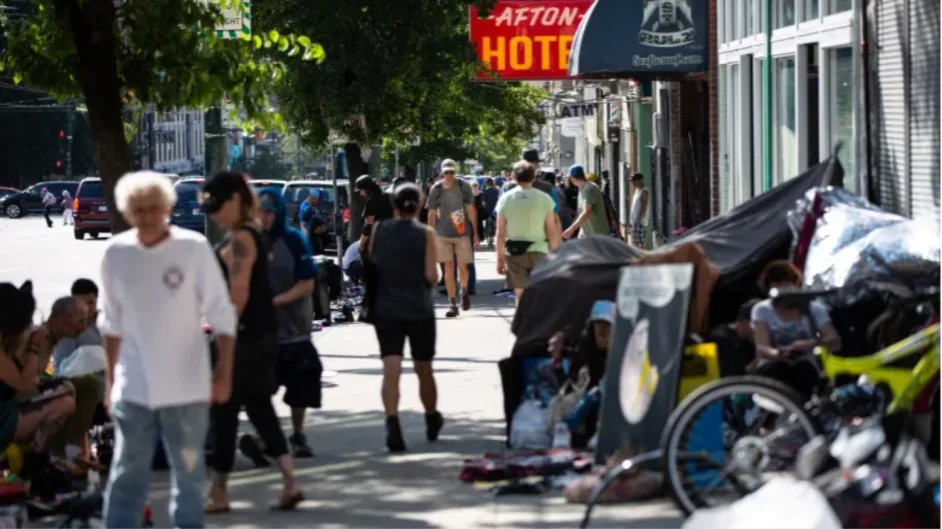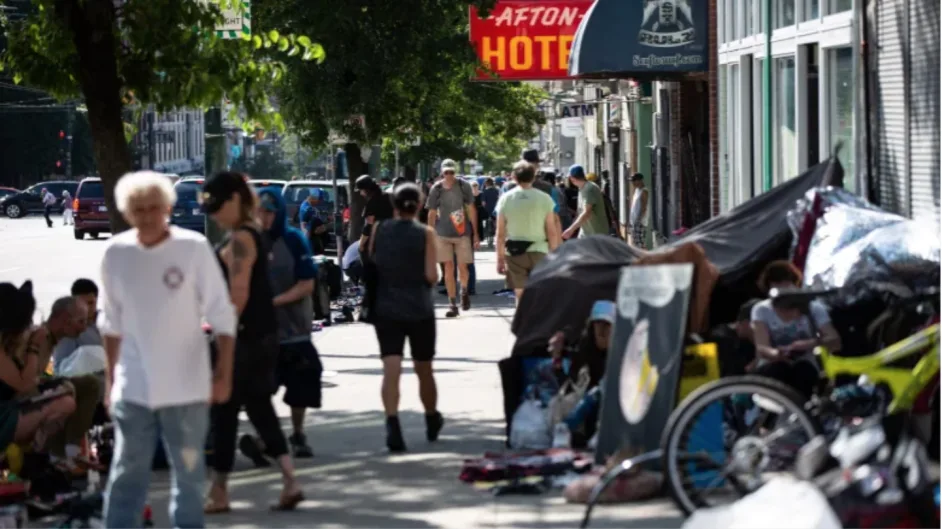
Incoming heat wave raises fears for people living on the streets
A potentially record-breaking heat wave forecast for B.C. this weekend spells particular danger for people living on the streets, advocacy groups say, as they rally resources to provide shelter and water.
Following a hot spell earlier this week, a second ridge of high pressure is set to usher in heat from the U.S. midwest starting Friday and will centre over Vancouver Island, pumping that heat far to the north, CBC meteorologist Johanna Wagstaffe said.
Environment Canada has issued a heat warning for most of the province, with temperatures in the Interior expected to surpass 40 C and reach close to that mark on the South Coast.
Covenant House Vancouver, which provides food, shelter and clothing to youth in need, is now quickly organizing supplies for the upcoming heat, associate director Chelsea Minhas said.
"This one kind of creeped up on us. It's pretty early for this type of heat wave but we've been gathering supplies and we'll make sure we're ready [and] that we have enough water bottles," said Minhas.

East Hastings Street in Vancouver’s Downtown Eastside in August 2019. Union Gospel Mission says volunteers will be handing out water, sunscreen and breathable clothing to people without shelter in the area. (Maggie MacPherson/CBC)
RELATED: Record-shattering heat set to engulf Western Canada, threaten public health
She said people living on the street are particularly vulnerable to extreme temperatures.
"This kind of heat is extremely dangerous, especially on the street when you don't have shelter or access to cool clothing or food or water ... as well as sunscreen, so sunburns and heat stroke start to go up in our population at this time as well," said Minhas.
SEE ALSO: How extreme heat can impact the human body, warning signs to watch for
Union Gospel Mission's drop-in location on East Hastings Street has been open this week during peak times of the day to allow people to come in out of the heat, while an outreach team is handing out supplies in the neighbourhood, spokesperson Nadia Tchoumi said.
"They'll be handing out water, sunscreen, shirts — light, breathable material shirts," said Tchoumi.
Vancouver city officials say they want to ensure people are aware of several cooling centres that will be open across the city over the weekend.
Residents are invited to use any of the city's 10 air-conditioned community centres, including all libraries, to cool down and rehydrate, the city's director of emergency management Daniel Stevens wrote in a statement Thursday.
There are more than 200 drinking fountains, including additional temporary drinking fountains installed around the city, he added.
The city will also install temporary misting stations on Friday, but the statement did not include the planned locations.
WATER RESOURCES
Organizations in the Fraser Valley are also handing out water and supplies to help people living on the streets.
The Salvation Army in Chilliwack says it is providing more water resources at their shelter and have an area set up on their property for people who are homeless to access shade and water.
Ruth and Naomi's Mission in Chilliwack is also making water available to those who need it.
LEAVE PETS AT HOME
Meanwhile, the B.C. SPCA is underlining the dangers of leaving pets in hot cars.
"Last year we responded to more than 800 calls of pets in distress in parked vehicles and definitely we're seeing the calls coming in already again this year," spokesperson Lorie Chortyk said.
RELATED: What to do if you see a dog in a hot car
Leaving a pet in a vehicle on hot day for just 10 minutes can cause irreparable brain damage, so it is better to keep them at home, she said.
Chortyk said if people see a pet in a vehicle when the temperature is high, they should contact police or call the B.C. SPCA for help.
This article, written by Meera Bains, was originally published for CBC News.










